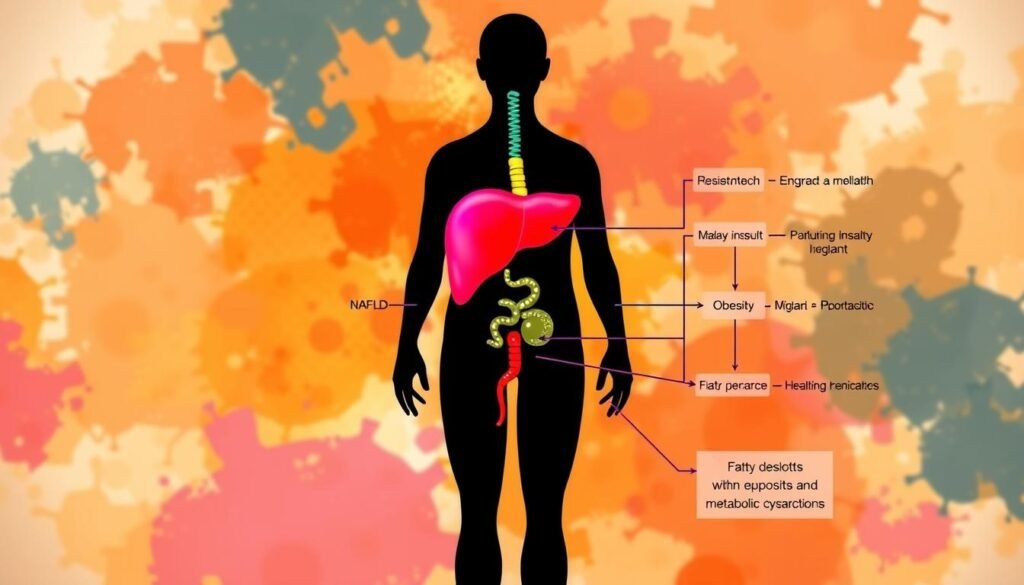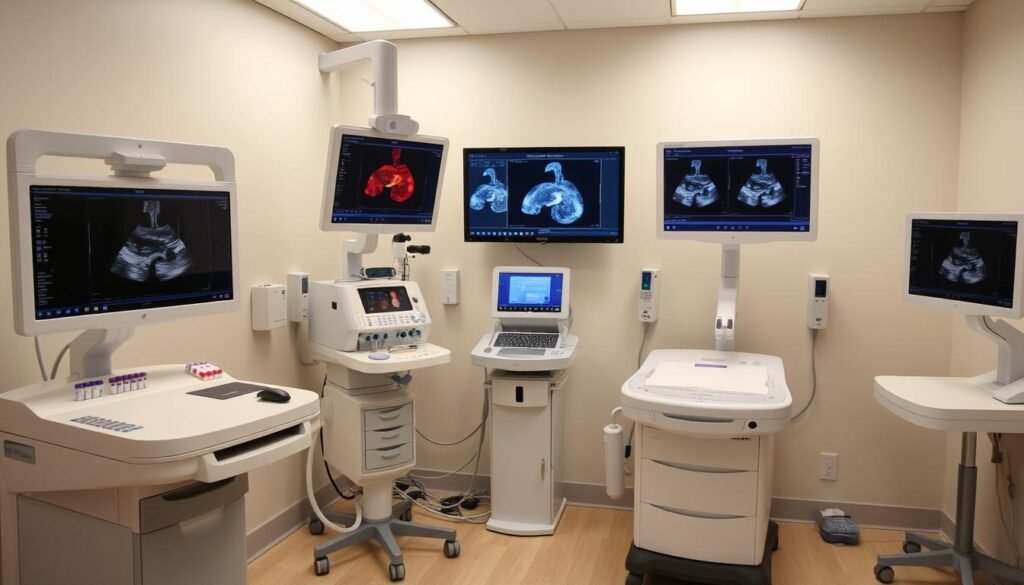Over 25% of people around the world have Non-Alcoholic Fatty Liver Disease (NAFLD). As more people get this condition, learning to manage weight and liver health is key. This guide will make the complex topic of fatty liver management easier to understand. It will focus on how lifestyle changes can fight this growing problem. Without specific medicines, could diet and exercise be the answer to NAFLD? This discussion suggests new ways to not just help the liver, but also to improve overall health.
This guide offers advice based on science and current health guidelines. It covers the basics of NAFLD and how to address it through diet and exercise. For those wanting to better their liver health and lose weight, this guide is a helpful tool.
Key Takeaways
- NAFLD affects over 25% of individuals worldwide.
- Weight loss of at least 5% can reduce liver fat; 10% may reverse liver fibrosis.
- A Mediterranean diet is beneficial for NAFLD management.
- Engaging in 150-300 minutes of physical activity weekly is advised.
- Body composition changes are crucial for tracking progress in liver health.
Understanding Non-Alcoholic Fatty Liver Disease (NAFLD)
Non-Alcoholic Fatty Liver Disease, or NAFLD, happens when too much fat builds up in the liver. This occurs without drinking much alcohol. It is now the most common liver disease in the Western world, affecting up to 30% of adults. NAFLD can come from not being active, being overweight, or having type 2 diabetes.
Most people with NAFLD don’t know they have it because it doesn’t show symptoms. Doctors often find NAFLD through blood tests or scans. It’s important to catch it early. This helps prevent serious problems like severe liver damage or cancer.
NAFLD is closely linked to issues like obesity, high blood fats, and insulin problems. Some with NAFLD might also have problems with vitamin A and liver copper, which affects their liver.
Genes and lifestyle both matter in NAFLD. Some gene mutations increase the risk. Changing what you eat to lose weight is key for treatment. This helps everyone, even those who aren’t overweight. Also, new studies are looking at tiny molecules in our bodies to check liver health in people with NAFLD.
Today, more people worldwide are getting NAFLD. This makes learning about it and how to manage it very important. By living healthier, people can better their liver health and dodge major risks that come with NAFLD.
Importance of Lifestyle Modifications
Lifestyle changes are key in fighting Non-Alcoholic Fatty Liver Disease (NAFLD). People with this disease see great benefits from changing their habits. This helps them lose weight and manage liver fat. Eating better, getting more exercise, and using good habits lead to success.
Studies have found that losing just 5-10% body weight greatly helps. For example, a study by Promrat showed losing 8.7 kg from diet and exercise after 48 weeks. Wong’s research found a diet low in fat and sugar helped people lose 5.6 kg. It also lowered liver fat levels.
These outcomes prove that changing how you live can improve your health. In Gepner’s study, people lost 3.2% to 7.3% of their weight by changing their diets. This shows the power of a good diet and making changes that last.
Wanting to change for yourself is critical if you have NAFLD. Sticking to these changes helps you lose weight and get healthier in the long run. Doing regular exercise and eating well lowers liver fat and boosts your metabolism. So, it’s really important to learn about and keep up with these healthy habits.
Weight Loss and Fatty Liver Management
Managing fatty liver disease often relies on losing weight effectively. Studies link weight loss with better liver health for people with NAFLD. Losing weight reduces liver fat, improves insulin sensitivity, and lowers risk of metabolic disorders. Goals for weight loss are vital in improving severe disease forms, like NASH.
Correlation Between Weight Loss and Liver Health
Targeted weight loss greatly improves liver function. Research finds losing 7-10% of body weight can greatly help those with NAFLD. Even losing 3-5% of body weight can reduce liver fat. Healthy eating, regular exercise, and lifestyle changes are key in managing this condition.
Recommended Weight Loss Targets for NAFLD
The American Gastroenterological Association sets weight loss goals for NAFLD patients. Here are their recommendations:
| Weight Loss Percentage | Potential Liver Health Benefits |
|---|---|
| 3% – 5% | Initial reduction in liver fat levels |
| 7% – 10% | Significant improvement in liver enzyme levels and decreased risk of fatty liver progression |
| ≥10% | Potential resolution of NASH and improved histological findings |
Combining diet changes and regular exercise, about 150 minutes a week, with monitoring can help manage NAFLD. These lifestyle changes improve liver function and overall health. This shows the strong link between weight loss and managing fatty liver. For more information, check these detailed studies and guidelines.
Healthy Diet Plans for Liver Health
Eating well is key for liver health, especially with Non-Alcoholic Fatty Liver Disease (NAFLD). Adding the right nutritional components boosts liver health. It also makes you feel better all around. Choosing whole foods over junk food is the base of effective healthy diet plans.
Key Nutritional Components
To keep your liver running well, make sure these nutritional components are in your diet:
- High intake of fruits and vegetables
- Whole grains, such as oatmeal and brown rice
- Healthy fats from sources like olive oil and fatty fish
- Beans and legumes to increase fiber
- Nuts, which may help reduce inflammation
Stay away from processed and high-fat foods, as well as added sugars. These harm liver health. Eating low-calorie and keeping a good balance of nutrients are key. They help reduce fat in the liver and improve its function.
Mediterranean Diet Advantages
The Mediterranean diet is great for the liver. It’s filled with fruits, veggies, and whole grains. Plus, it includes fats that are good for the heart. Studies show that it really helps people with NAFLD.
- Rich in unsaturated fats, notably from olive oil
- Incorporates fatty fish, which are beneficial due to omega-3 fatty acids
- Encourages the consumption of legumes, contributing to better liver health
- Promotes reduced intake of red meats and processed foods
This diet is about more than just the liver. It also helps the heart stay healthy. People who follow it often see their liver function get better. They have less inflammation and manage their weight more effectively.
Exercise Routines to Support Weight Loss
Exercise is key in handling NAFLD and losing weight effectively. Knowing which exercises work best and following weekly tips is crucial for good health.
Types of Exercises Beneficial for NAFLD
Adding different exercises can greatly improve your health and liver. Try to include:
- Aerobic exercises: Walking, swimming, and cycling are great for losing weight and reducing liver fat.
- Resistance training: Strength training builds muscle and betters your metabolism.
- High-intensity interval training (HIIT): Intense activity bursts with rest periods enhance fitness and help with weight loss.
- Flexibility exercises: Yoga and stretching increase flexibility and help stick to a workout plan.
Recommended Weekly Exercise Guidelines
To manage NAFLD, following exercise recommendations is vital. The ACSM suggests at least 150 minutes of medium-effort exercise every week. You should:
- Spend 150 to 240 minutes on medium-effort aerobic activities weekly for less liver fat.
- Add strength training to your routines at least two times a week for better health.
- Slowly make workouts longer and more challenging to keep losing weight and improve liver health.
Working with doctors to tailor exercise plans brings the most benefits, especially for weight loss and NAFLD treatment.
Metabolic Syndrome: A Relationship with NAFLD
Metabolic Syndrome plays a big role in NAFLD development. It’s linked to several health issues like belly fat, high blood pressure, and high blood sugar. Because of these, people might face liver problems. About 20-30% of adults in Western countries have NAFLD.
This condition is more common in obese people. Their rates may increase to 75%.
Insulin resistance is a key factor in both metabolic syndrome and NAFLD. It affects about 85% of those with severe NAFLD. Metabolic syndrome causes chronic inflammation. This increases harmful inflammation markers, making insulin resistance worse.
This makes it easier for NAFLD to develop.
Too much visceral fat harms liver health. It leads to more adipocytokines like TNF-α and IL-6. These substances can cause hypertension and other issues. Up to 88% of people with metabolic syndrome also have severe NAFLD.

Handling metabolic syndrome with lifestyle changes can help the liver. It lowers the risk of serious liver diseases. By understanding how metabolic syndrome and NAFLD are linked, we can better address them. This shows how crucial preventive actions and wellness plans are.
The Role of Nutrition Counseling
Nutrition counseling is key in managing non-alcoholic fatty liver disease (NAFLD). It offers tailored dietary advice that meets each person’s needs and lifestyle. Registered dietitians provide crucial support, helping people understand how to manage Weight Loss and Fatty Liver Management effectively.
Dietitians work with clients to set realistic, lasting dietary goals. They craft plans that include healthier options, taking into account each person’s dietary habits. This includes considering cultural tastes and what’s easy to get. Changing one’s diet is vital since some foods impact liver health directly.
Here’s what nutrition counseling includes:
- Finding and solving weight loss challenges with clear steps
- Introducing gradual lifestyle changes for better health habits
- Teaching how certain foods and diets influence NAFLD
Studies show that eating fewer calories, focusing on whole foods, and cutting back on added sugars helps manage NAFLD. Proper Nutrition Counseling teaches these healthy eating patterns, leading to lasting liver health benefits.
Keeping an eye on the diet plan and tweaking it as needed improves health outcomes. Those who get nutrition counseling find it easier to lose weight and handle fatty liver disease. With a focus on education and support, clients stick to their plans better. This leads to health improvements that last a lifetime.
| Nutrition Counseling Strategies | Benefits |
|---|---|
| Personalized Diet Plans | Designed for each person, making them more effective. |
| Behavioral Support | Helps overcome mental obstacles for better plan sticking. |
| Ongoing Monitoring | Adjustments can be made as one progresses. |
| Education on Liver Health | Gives people the info they need to make smart choices. |
Nutrition counseling helps with Weight Loss and Fatty Liver Management and builds a better relationship with food. This full-care approach is crucial for handling the growing issue of NAFLD, especially as lifestyles change.
Liver Health and its Impact on Overall Well-Being
Liver health is key to our overall well-being, affecting how our bodies function. In the U.S., about 40% of adults deal with liver issues related to being overweight. Fixing these issues can greatly improve a person’s health.
Poor liver health can cause serious problems, like cirrhosis and heart disease. People with non-alcoholic fatty liver disease might feel tired, weak, and have stomach pain. These symptoms show how the liver affects daily life.
Managing weight and changing lifestyle habits can make our livers healthier. Research shows that certain hormones can help even healthy individuals and those with liver problems by burning liver fat. This is critical for good liver function.
New medications are being developed to fight fatty liver disease. For example, semaglutide helps with weight loss and reducing liver fat. Doctors are also testing new drugs that work in different ways to help the liver.
Improving liver health leads to a better life. Eating right, staying active, and treating other health issues like diabetes and obesity are important steps. By doing so, people lower their health risks and enjoy life more.

| Key Factors | Impact on Liver Health | Impact on Overall Well-Being |
|---|---|---|
| Weight Management | Reduces fat accumulation and liver inflammation | Boosts energy levels and mood |
| Healthy Diet | Provides essential nutrients for liver function | Supports metabolic health and prevents chronic diseases |
| Regular Exercise | Improves liver metabolism and fat oxidation | Enhances physical fitness and mental health stability |
| Management of Health Conditions | Reduces complications associated with liver disease | Improves overall physical health and lifespan |
Body Composition Analysis to Track Progress
Understanding your body’s makeup is key when dealing with non-alcoholic fatty liver disease (NAFLD) and trying to lose weight. Tools like bioelectrical impedance analysis and DXA scans show fat and muscle mass. This makes it easier for doctors and patients to watch health changes closely.
More than 130 million people worldwide have NAFLD. So, knowing how to track body composition is crucial. This info helps create personalized plans for better health. It points out what to focus on, shaping diet and exercise plans for weight goals.
Keeping an eye on your progress helps stay on track and motivated. Seeing changes in body composition alongside health can drive success in managing weight and fatty liver. It also guides lifestyle changes for lasting results.
Want to learn more about body composition and fatty liver? A detailed review explains how changes in body composition affect liver fat in NAFLD patients. Find out about different ways to assess it and their real-world benefits: read more here.
Monitoring Liver Health: Diagnostic Tests
Keeping an eye on liver health is very important. This is especially true for people with non-alcoholic fatty liver disease (NAFLD). NAFLD means there’s too much fat in the liver. By checking the liver regularly, we can stop the disease from getting worse. Diagnostic tests are key because they tell us how the liver is doing.
There are many ways to check how the liver is working. Here are a few:
- Blood Tests: Doctors look at liver enzymes, hormone levels, and other markers. These tests show if there’s inflammation or damage.
- Imaging Techniques: Tools like ultrasound and MRI help see the liver’s shape. They can spot fat and scarring.
- Liver Biopsy: This test takes a tiny piece of liver tissue to look at closely. It helps see how much damage there is.
Every test mentioned plays an important part in monitoring liver health. The results help doctors understand how severe NAFLD is. They then use this information to decide on the best treatment. Regular checks are crucial for better care and health outcomes.
New developments in testing are bringing hope for better handling of NAFLD. If you’re interested in learning more about this disease and ways to stay healthy, you can find more information here.

Conclusion
The rise of obesity, type 2 diabetes, and NAFLD is a major health issue worldwide. Weight loss and fatty liver management are vital in tackling these problems. A healthy lifestyle, including weight loss through diet changes or medication, improves liver health. This helps even those who are not obese.
Research shows weight management is key for people with NAFLD. It not only helps improve liver indicators but also boosts life quality. In the future, including weight loss programs in liver disease care will enhance patient treatment.
By focusing on weight loss and healthy living, individuals at risk for NAFLD can greatly better their liver health. This also helps in the fight against obesity. Continued research and health efforts are crucial in finding better treatments for these conditions.